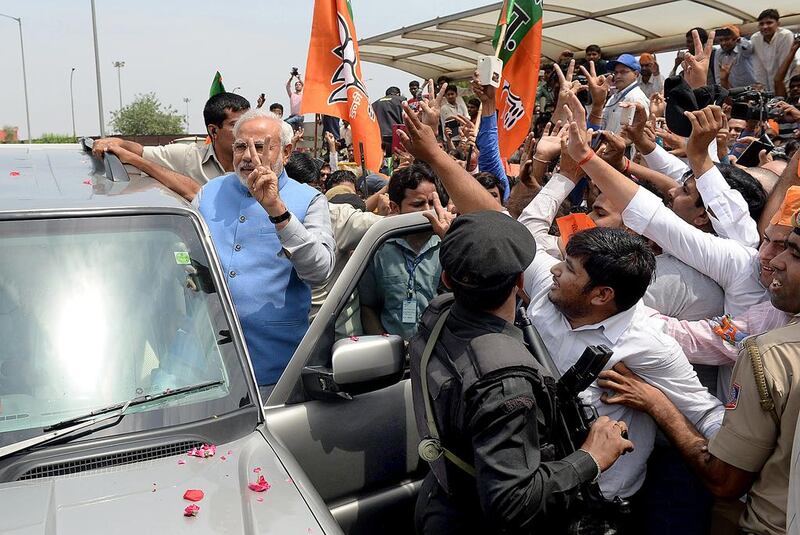India is beginning to wrap its head around the astounding election victory for the Hindu nationalist Bharatiya Janata Party and its leader Narendra Modi.
Certainly, the BJP’s euphoria, having won 282 seats in a house of 543, is justified. It is not hobbled by recalcitrant or greedy allies, nor is it dependent on anyone else for survival. It has the mandate to rule India in its own image for the next five years, and it doesn’t have to answer to anyone else. For Mr Modi, the opportunity to change or mould the character of a diverse, multifaceted, secular nation is finally here.
For someone who, through the course of the campaign, insisted that his only motto was “progress and development for everyone,” it would be too obvious for Mr Modi – as well as the Rashtriya Swayamsevak Sangh, the mother organisation from which the BJP springs – to target the big game. Examples include putting into place a uniform civil code that all minority as well as majority communities would have to abide by, or abolishing Article 370 of the Constitution that gives special status to the state of Jammu and Kashmir.
The anxiety among India’s liberal class is that Mr Modi will shift the ground – very subtly – between the lines on key issues.
One way would be to promote “Hindutva”, an aggressive, Hindu right-wing fervour in areas of public policy that have hitherto been sacrosanct, such as education. One key concern is that a Modi government will staff universities and colleges with people of their own ilk, thereby paving the way for the rewriting of textbooks that promote the ideologies and heroes of right wing Indian movements.
In retrospect, it seems clear that the so-called “Modi tsunami” that engulfed the countryside was the sum of several, small waves containing several different strategies for working the vote.
It also seems clear that a Hindu-Muslim polarisation fed into the larger picture of complete disgust with the outgoing Congress party’s inability to staunch large-scale corruption. Mr Modi also promoted the fact of his being from a backward caste, especially to audiences in central and eastern Uttar Pradesh and Bihar, where these caste groups form a large chunk of the electorate.
Yogi Adityanath, a self-made holy man who won for the fifth time representing Gorakhpur, a constituency near the India-Nepal border, was only second to Mr Modi in campaigning across eastern Uttar Pradesh, especially in places with large Muslim populations. The idea was to polarise the Hindu population into voting for Mr Modi by showing them that Muslims were voting for the man best placed to defeat the BJP.
The Congress party itself is reduced to 44 seats, of which the only two in Uttar Pradesh were won by the mother-son duo of Sonia Gandhi-Rahul Gandhi. Both caste-based parties in this state have been demolished, with the pro-Dalit Bahujan Samaj Party unable to win even one seat.
Does this mean that India is turning into a right-wing nation? Certainly, this is clear from the saffron sweep on view. And yet, the overwhelming vote in favour of the BJP is not only a vote for extreme right wing politics, but also a yearning to put the centre back into Indian politics. Perhaps the most important argument in favour of Mr Modi is that he has been able to transform his native Gujarat into a prosperous state. Fed up with the pervasive corruption and rampant inflation, Indians voted unanimously to change their leaders.
Certainly, this is a pivotal moment in Indian politics and it has lessons for both the winning and losing sides.
For the BJP, victory cannot mean the institutionalisation of a “Hindu centre”. India is too diverse a country, not only because of its minority Muslim, Sikh, Christian, Parsi and Buddhist populations, but also Dalits and tribals and animists and sun-worshippers. Moreover, Hindus are hardly a unified group, despite their recent political forging in these elections.
The lesson from these elections can hardly be that India is becoming a Hindu state and it doesn’t need anybody else’s help to win – even if not a single Muslim has been elected to Parliament this time. Mr Modi would be making a mistake if he takes revenge on all those who didn’t vote for him, about 69 per cent of the population. Watch the wind turn if he does.
As for the Congress party, it is too soon to write its epitaph yet. The 129-year-old party not only has branches in every village and district, but has an inclusive ideology that spans the political and ideological spectrum. The Gandhi family may have run its course in the party – certainly, the party needs to emerge from its self-imposed dynastic rule and attract both fresh blood and new ideas.
Mr Modi himself, meanwhile, has returned to Delhi from Varanasi, the heart of the Hindu tradition and now his constituency. Give me 60 months, he has pleaded with the people. They have. His time starts now.
Jyoti Malhotra is a political and foreign affairs analyst based in Delhi





